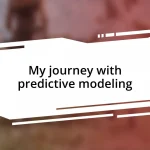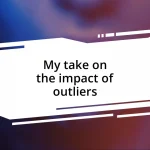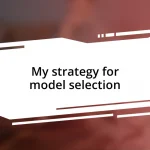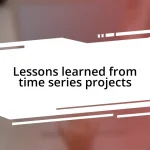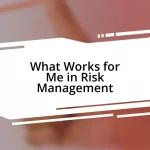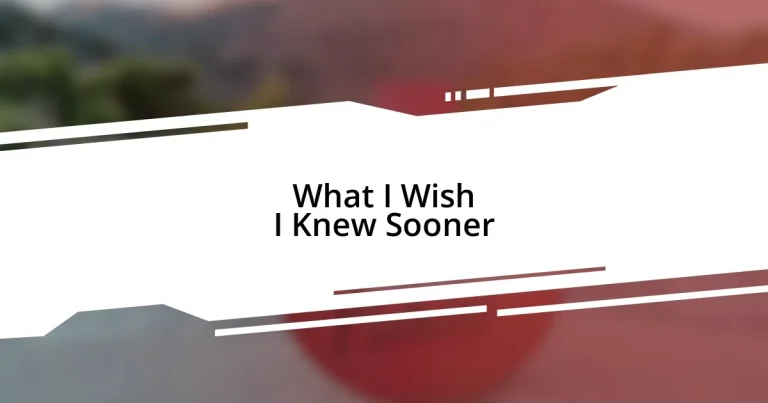Key takeaways:
- Taking calculated risks and overcoming fear can lead to missed opportunities; embracing feedback fosters personal growth.
- Building meaningful relationships is strengthened through vulnerability and consistency; shared experiences deepen connections.
- Effective time management through prioritization and saying “no” enhances productivity and well-being.
- Adaptability is essential for personal growth; embracing change can open up unexpected opportunities and perspectives.
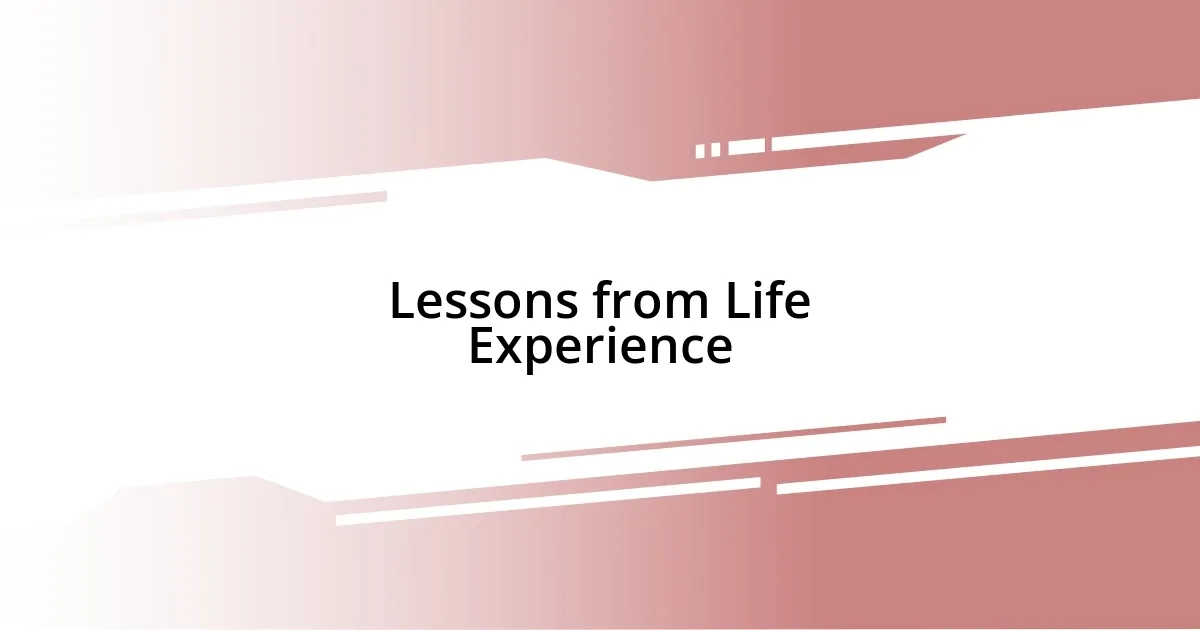
Lessons from Life Experience
One lesson I learned the hard way is the importance of taking calculated risks. I remember a time when I hesitated to apply for a dream job because I thought I wasn’t qualified enough. Looking back, I realize how much I missed out on by letting fear dictate my choices. What opportunities have you turned down out of fear?
Emotional resilience is another crucial lesson life has taught me. After a difficult breakup, I felt lost, like I wouldn’t recover. Yet, over time, I discovered how to rebuild myself through self-reflection and positive relationships. This journey made me appreciate the strength that adversity can cultivate within us. Have you found your own strength in tough times?
Lastly, I’ve come to understand the power of time management. I used to cram tasks at the last minute, thinking I worked best under pressure. However, I soon discovered that spreading tasks out and prioritizing made me more productive and less stressed. Isn’t it amazing how a little planning can open up so much mental space?
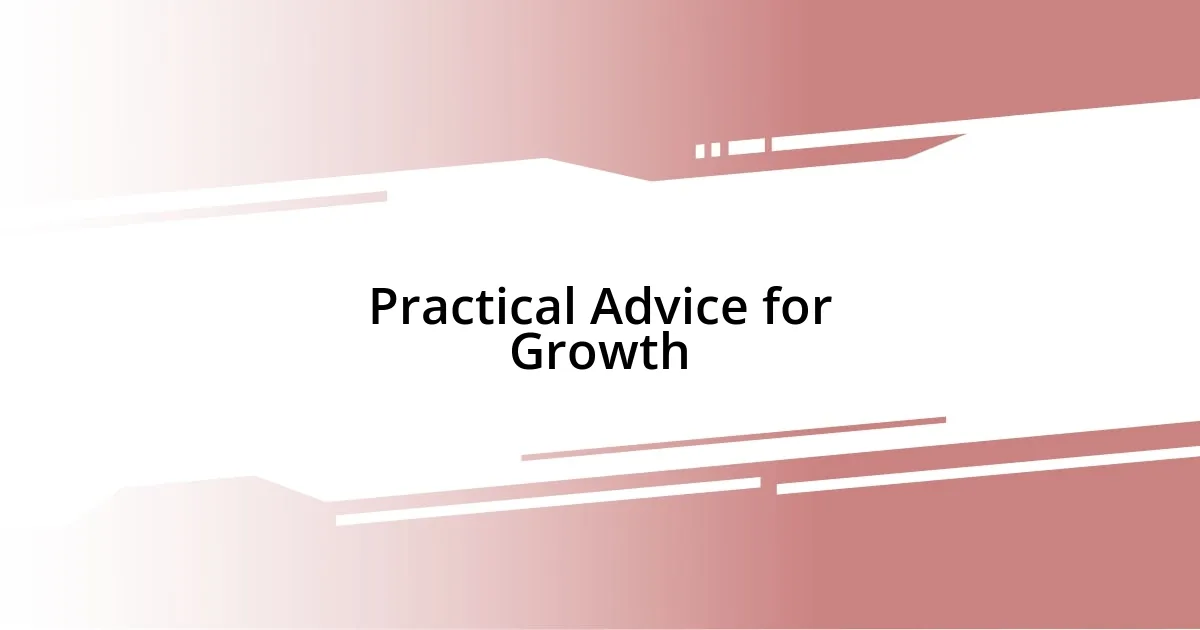
Practical Advice for Growth
Being open to constructive feedback has dramatically changed my approach to growth. I remember when a mentor pointed out my tendency to be defensive when receiving feedback. Initially, I felt criticized, but it dawned on me that they only wanted to help me improve. Since then, I’ve learned to embrace feedback as a gift rather than a threat. How do you react when someone offers you a suggestion?
Networking is another pillar for personal and professional growth. One time, I attended a conference not expecting much but ended up having an enlightening discussion with a speaker. That conversation led me to new opportunities I never imagined possible. It’s fascinating how one connection can change the trajectory of your journey. Have you taken the time to nurture your own networks?
Lastly, prioritizing self-care significantly impacts growth. I used to believe that pushing through exhaustion was a sign of dedication, but burnout taught me otherwise. Taking time to recharge allows for better focus and creativity. I now know that my best ideas come when I’m well-rested. What practices help you maintain your energy?
| Advice | Personal Experience |
|---|---|
| Embrace Feedback | My mentor’s insights taught me to view feedback as a growth opportunity. |
| Network Actively | A chance conversation turned into an unexpected career opportunity. |
| Prioritize Self-Care | Burnout made me realize that resting fuels creativity. |
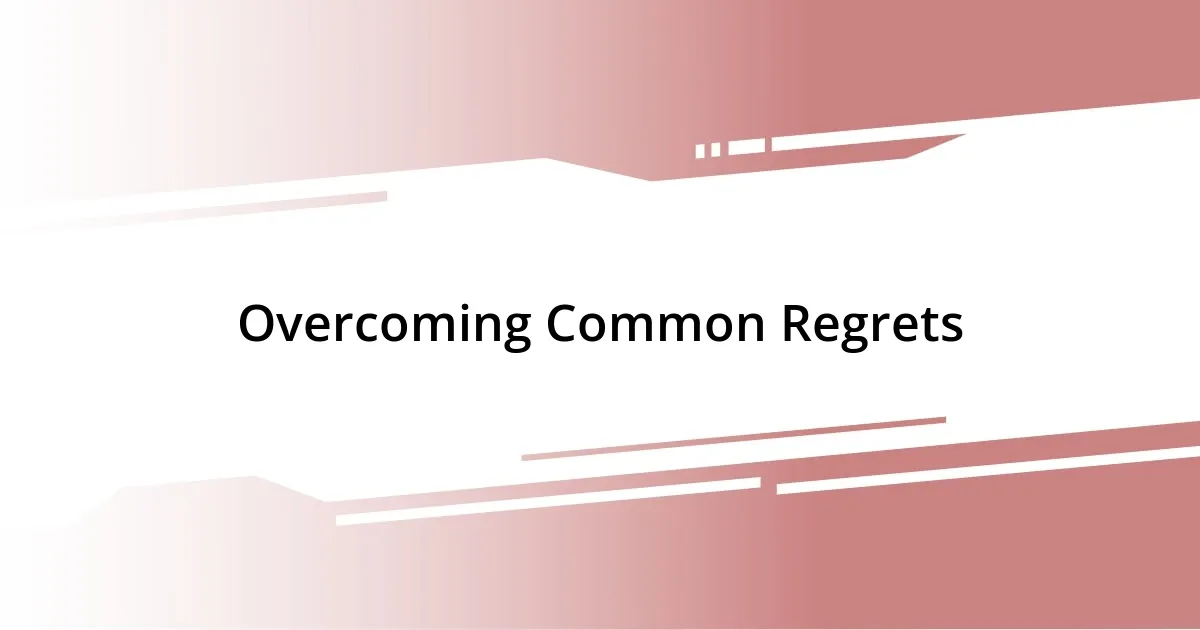
Overcoming Common Regrets
Overcoming regrets often requires a shift in mindset. I can clearly recall a time when I let my fear of failure hold me back from pursuing a passion for public speaking. It was a missed opportunity that lingered; I wished I had pushed myself outside my comfort zone sooner. In moments like these, I’ve learned it’s essential to reframe regrets as lessons instead of failures. Understanding that every choice shapes our journey is liberating.
Here are some practical strategies I found helpful in navigating past regrets:
- Practice Self-Forgiveness: Recognizing that everyone makes mistakes helped me let go of regret and embrace growth.
- Set Clear Goals: Writing down what I truly wanted gave me the clarity and motivation to take action, reducing the chances of future regrets.
- Seek Support: Talking about my regrets with trusted friends turned them from burdens into shared experiences, making it easier to process and learn from them.
By focusing on the future rather than dwelling on the past, I believe we can find true peace and purpose.
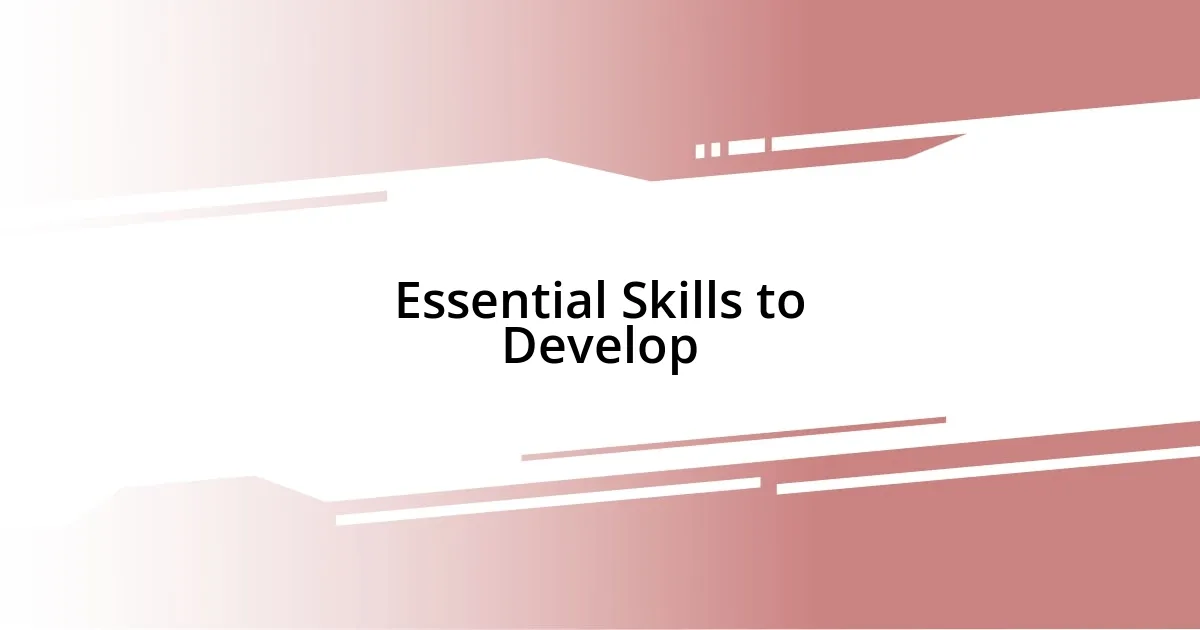
Essential Skills to Develop
Developing effective communication skills is essential for both personal and professional success. I remember a moment early in my career when I struggled to express my ideas clearly during meetings. It felt frustrating, and I often left feeling unheard. Once I started practicing active listening, everything shifted. Now, I not only connect better with others but also find that my ideas are more readily accepted. Have you taken the time to truly listen before speaking?
Another critical skill is adaptability. I learned this firsthand when my team faced unexpected changes during a project. Initially, I was resistant and stressed, fearing how those changes could derail our efforts. However, as I embraced flexibility and sought alternative solutions, not only did we complete the project successfully, but I also discovered new strengths within myself. How do you handle sudden changes in your plans?
Emotional intelligence is also an area I deeply value. Being aware of my emotions and those of others has fostered better relationships both at work and in my personal life. I recall a tense situation with a colleague that could have escalated, but by recognizing their frustrations, I was able to respond with empathy rather than defensiveness. It turned a potential conflict into a collaborative solution. When was the last time you paused to consider the emotions driving a conversation?
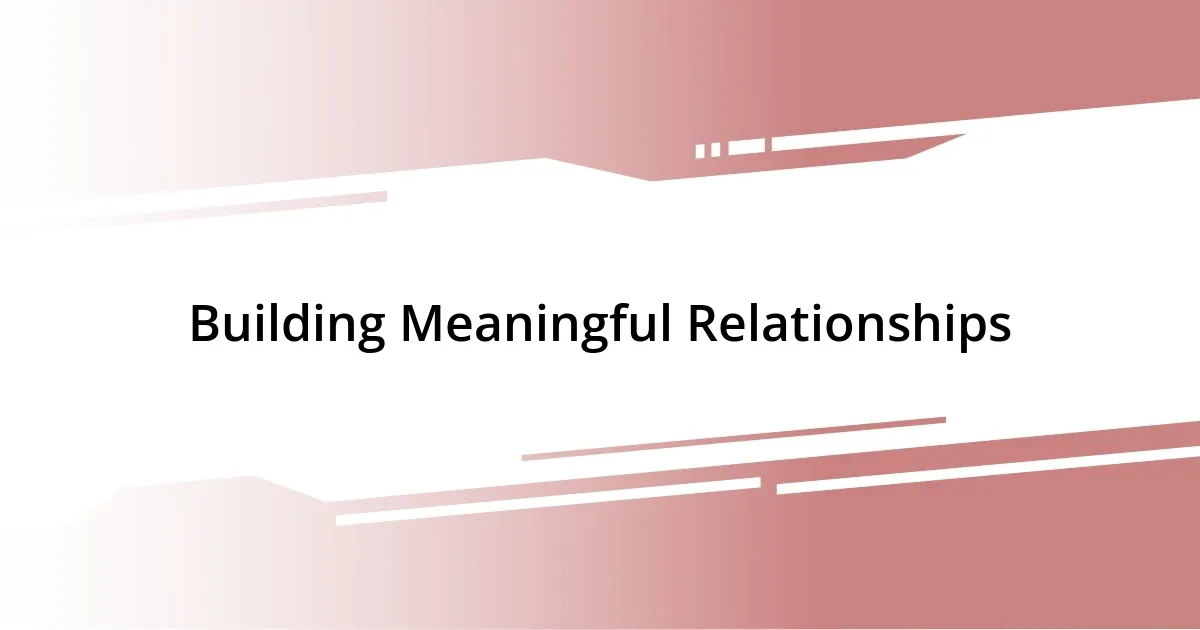
Building Meaningful Relationships
When I think about building meaningful relationships, I can’t help but reflect on the importance of vulnerability. There was a time when I tried to appear strong and self-sufficient, avoiding deeper conversations with friends. It wasn’t until I opened up about my struggles that I truly felt connections strengthen. Have you ever noticed how sharing your fears can actually create a stronger bond?
Another aspect that stands out to me is the power of consistency. I’ve experienced firsthand how reaching out regularly, whether through a quick text or an unexpected call, can nurture a relationship. It’s not always about grand gestures; sometimes, just checking in can mean the world. How often do you make time for the people who matter the most in your life?
Lastly, I believe in the significance of shared experiences. I recall the summer I volunteered at a local shelter. Not only did I meet incredible people, but we also bonded over our common goals. Engaging in activities together can forge connections that deepens understanding and trust. Have you tried participating in something meaningful with others? It’s an enriching way to cultivate lasting relationships.
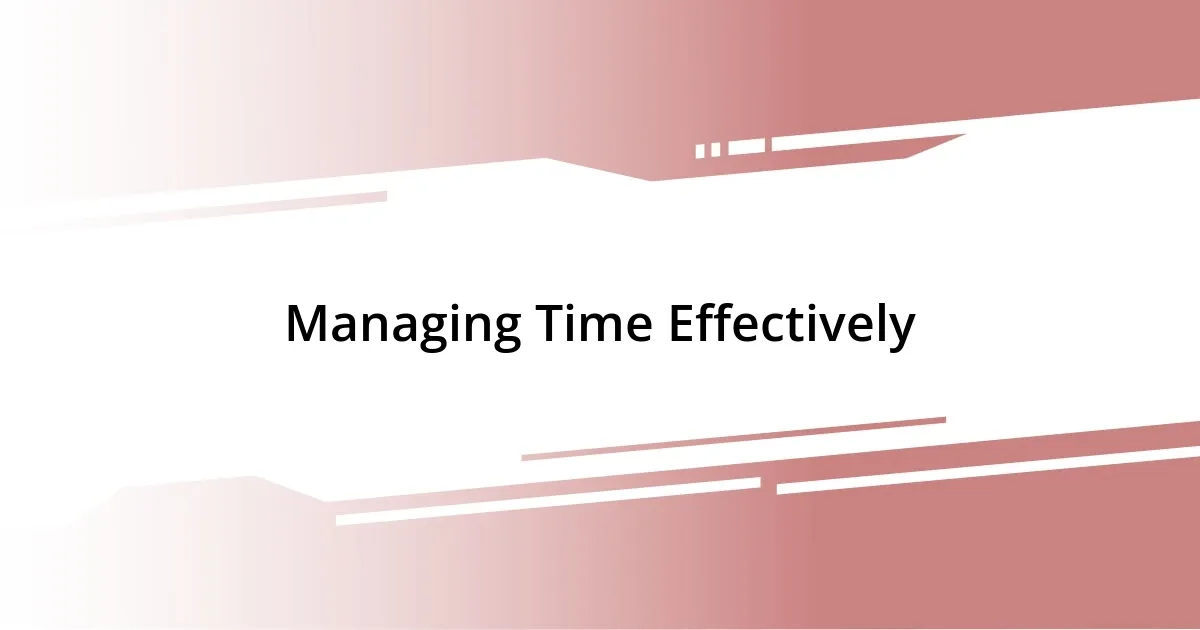
Managing Time Effectively
Managing time effectively has been a game-changer for me. I remember a particularly busy week when it felt like I was spinning my wheels—juggling deadlines and meetings without a solid plan. It wasn’t until I started using a simple time-blocking method that everything clicked into place. By dedicating specific chunks of time to different tasks, I found not only increased productivity but also a sense of control. Have you ever tried blocking out your schedule? It can transform how you approach your day.
Something I wish I’d known sooner is the value of prioritization. Early in my career, I often tackled tasks based on urgency rather than importance, which led to burnout and inconsistency. By learning to focus on what truly mattered—like aligning my daily tasks with long-term goals—I’ve been able to work more efficiently and enjoyably. How do you decide what to tackle first? I’ve discovered that creating a simple “must-do” list can clarify my priorities and keep me on track.
Lastly, I can’t underestimate the power of saying “no.” I’ll never forget the time I overcommitted, agreeing to several projects that stretched me thin. It took a toll on my well-being and the quality of my work. Once I realized that protecting my time was essential for maintaining my effectiveness, I felt empowered. Learning to decline offers that don’t align with my goals was quite liberating. Have you had to navigate similar dilemmas in managing your time? Reflecting on this has been eye-opening for me, and I hope it resonates with you as well.
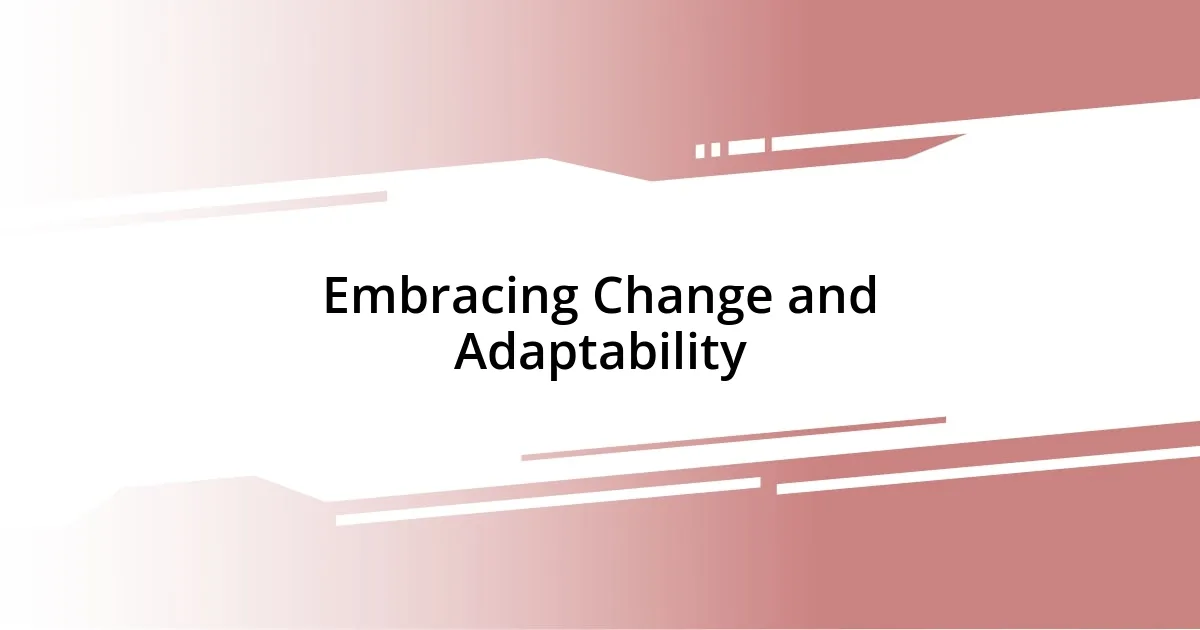
Embracing Change and Adaptability

Embracing Change and Adaptability
Embracing change has been a journey for me, fraught with challenges yet filled with growth. I remember my first big career shift; I was terrified. However, stepping into the unknown opened doors I never expected. Have you ever felt that tension between comfort and uncertainty? It often requires courage, but the rewards can be transformative.
Adapting to new situations became essential during a major life event for me—relocating to a new city. I initially felt lost, missing my familiar routine. Yet, I discovered that exploring this new environment not only acclimated me but also pushed me to engage with fresh perspectives and people. How might embracing a new and uncharted situation promote your personal growth? Sometimes, the discomfort can lead us to the most enriching experiences.
Ultimately, I’ve realized that adaptability is like a muscle; the more you practice it, the stronger it becomes. Each time I faced unexpected changes, I learned to pivot rather than resist. Recently, when a project deadline shifted dramatically, I felt the initial sting of panic. Instead of succumbing to it, I found creative solutions that not only met the deadline but also enhanced the project’s quality. Isn’t it fascinating how adaptability can open up new paths we hadn’t considered? The process can be daunting, but it’s also where the magic often lies.




